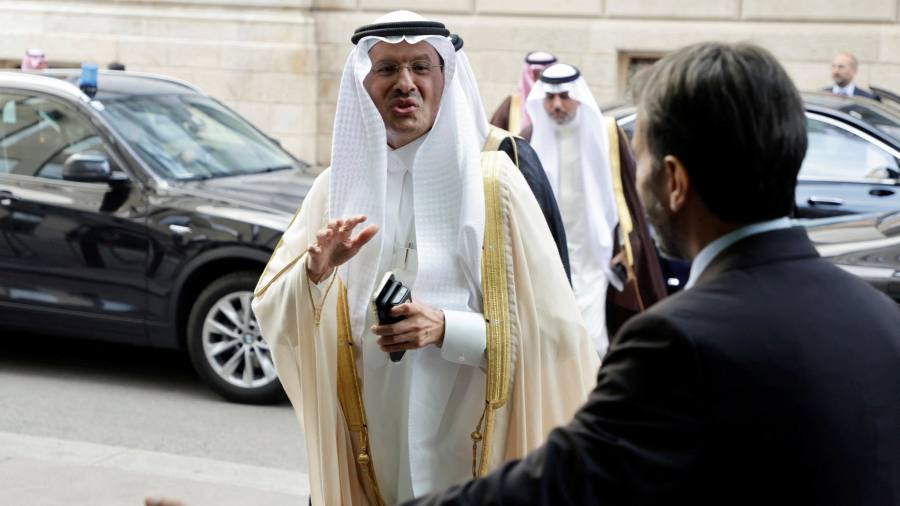Saudi Arabia aims to cut oil prices by 1 million barrels per day

Saudi Arabia announced it would cut production by 1 million barrels per day to support oil prices after a tough OPEC+ producer group meeting in Vienna on Sunday.
Saudi Energy Minister Prince Abdulaziz bin Salman, OPECThe move comes as part of an agreement that several weak African members will have their quotas cut from next year. Russia, the world’s second-largest oil exporter, could also cut its production target, but the group said it would be subject to review. Meanwhile, the UAE could increase production.
Oil prices have fallen over the past 10 months despite attempts by producers to tighten supply. Saudi Arabia and other members announced surprise price cuts in April, but prices briefly rose toward $90 a barrel before reversing and dropping to nearly $70 a barrel last week.
Crude oil prices surged Monday morning. International benchmark Brent crude rose 1.1% to trade at $76.98 a barrel, while US equivalent West Texas Intermediate rose 1.3% to $72.66. WTI so far has surged 4.6%, while Brent has peaked at 3.4%.
Prince Abdulaziz said the 1 million barrel-per-day cut would initially end in July, but could be extended. He described it as a “Saudi lollipop”, or sweetener, for the group, and other members escaped additional cuts this year.
“We just want to finish what we’ve been doing,” he said. “We will do whatever it takes to bring stability to this market.”
The cuts lowered Saudi production to 9 million bpd in July, compared to the 500,000 bpd cut Saudi Arabia announced in April, when Saudi production was about 10.5 million bpd. added to.
Giovanni Staunovo, a UBS commodities analyst who attended the meeting, said this was a “strong statement” for Saudi Arabia, as 9 million barrels per day is a “very low” production level for the country. Its maximum production capacity he is close to 12 million b/d.
“This level is very low, considering that we are not in a global recession,” Mr. Staunovo said.
“This is a clear signal that they want to achieve what they call ‘market stability’.”
The IMF estimates that Riyadh will need $80 a barrel to balance its finances and finance some of the “huge projects” that Crown Prince Mohammed bin Salman wants to transform the economy. It is said that the price of crude oil needs to exceed.
The OPEC+ group’s joint production target has been adjusted to 40.5 million barrels per day in 2024, formalizing and extending voluntary cuts announced at the group level in April.
There was some debate about the distribution of the cuts, and many African countries initially resisted efforts to lower production standards. These are considered to reflect maximum production capacity and are used to calculate the size of cuts required.
Weaker OPEC members, including Nigeria and Angola, already struggling to meet existing production targets due to years of underinvestment, have been reluctant to cut further.
However, the UAE is pushing for a higher production baseline, reflecting investment in its own industry. The production target will increase by about 200,000 barrels per day from January to 3.2 million barrels per day. Angola, Nigeria and others can cut their targets, but analysts say this only reflects what they can produce and shouldn’t remove a significant number of barrels from the market.
According to the agreement, Russia could also have its production targets cut, depending on the findings of an independent expert’s assessment of current production levels.
“We, as usual, have found common ground,” said Russian Energy Minister Alexander Novak at the end of the meeting.
OPEC has come under fire for its alliance with Russia after last year’s all-out invasion of Ukraine and for trying to prop up prices during the energy crisis sparked by Russia’s actions.
But analysts say the fall in oil prices since October may have made the White House more optimistic about further cuts as the United States seeks to mend ties with Saudi Arabia.
Several journalists, including the entire Reuters and Bloomberg team, were barred from attending weekend meetings in a sign of pressure on the Saudi energy minister, half-brother of Saudi de facto ruler Prince Mohammed bin Salman. rice field.
OPEC Secretary General Haitham Al-Ghais said he had invited other journalists from around the world but said he would continue to choose which reporters to invite, and when asked about the decision he said: “Here is our home,” he said.
Additional report by William Langley in Hong Kong
https://www.ft.com/content/05d3a7b5-b9c9-43ec-ac53-f8b7b51cbbe2 Saudi Arabia aims to cut oil prices by 1 million barrels per day



